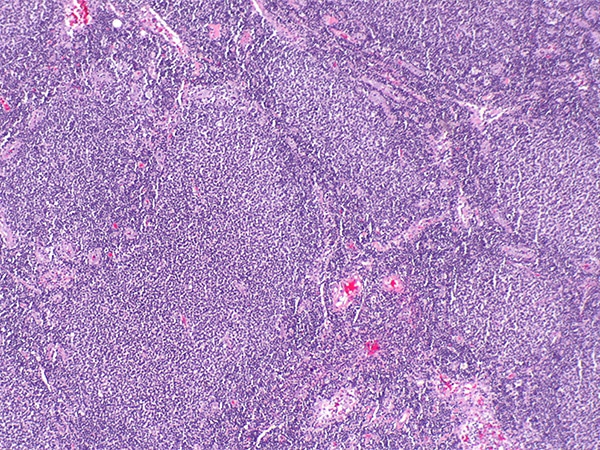Targeting Several Blood Cancers
The FDA has approved a new molecularly targeted therapeutic called duvelisib for treating certain patients with blood cancer.

The U.S. Food and Drug Administration (FDA) recently approved a new molecularly targeted therapeutic called duvelisib (Copiktra) for treating certain patients with blood cancer.
Duvelisib is intended for patients with chronic lymphocytic leukemia (CLL), small lymphocytic lymphoma (SLL), and follicular lymphoma whose disease has progressed after they have received at least two other types of treatment.
Blood cancers, or hematologic cancers, arise in blood-forming tissue, such as the bone marrow, or in cells of the immune system.
Non-Hodgkin lymphoma is the most common blood cancer diagnosed in the United States. In 2019, 74,200 people in the United States are expected to be newly diagnosed with the disease, according to data from the National Cancer Institute (NCI). About 20 percent of these cases will be classed as follicular lymphoma, which is a slow-growing type of non-Hodgkin lymphoma that arises in immune cells called B cells.
CLL and SLL are also slow-growing blood cancers that arise in B cells. According to the NCI, CLL and SLL are essentially the same disease, but have different names depending on where in the body the cancer cells accumulate. CLL cells are found mostly in the blood and bone marrow, whereas SLL cells are found mostly in the lymph nodes. The latest federal statistics show that the number of new cases of CLL and SLL was 4.5 per 100,000 U.S. men and women per year.
Duvelisib targets two forms of a molecule called phosphatidylinositol 3-kinase (PI3K), PI3K-delta and PI3K-gamma. PI3K is a component of a signaling pathway that has a key role in promoting the survival and expansion of many types of cells, including the B cells affected in CLL, SLL, and follicular lymphoma. PI3K is, therefore, a prime therapeutic target for these blood cancers.
The approval of duvelisib for CLL and SLL was based on results from a randomized phase III clinical trial, which showed that a significantly greater proportion of patients responded to treatment with duvelisib compared with the standard treatment ofatumumab (Arzerra). In fact, 78 percent of the 95 patients who received duvelisib responded to treatment with the molecularly targeted therapeutic compared with 39 percent of the 101 patients who received ofatumumab. The median length of time before disease progressed was also longer among those receiving duvelisib compared with those receiving ofatumumab (16.4 months versus 9.1 months).
The approval of duvelisib for follicular lymphoma was based on results from one arm of a randomized phase III clinical trial. The results showed that 35 of 83 patients whose disease was not responding to standard treatments (42 percent) responded to treatment with duvelisib. One of these patients had complete shrinkage of their tumor; the rest had partial tumor shrinkage.
The FDA approval was rendered on Sept. 24, 2018.
